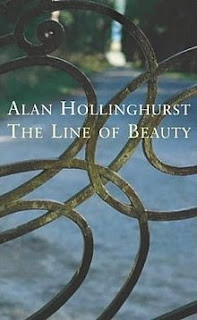*Small Spoilers Below*
There are books where it's obvious what they're trying to do. Tell a good yarn, or argue a certain point, or keep you speechless with the amazing prose. Then there are those where you have to dig a little, sit and think a little, let the meaning dawn on you. Then there's this book, which both tells the attentive reader outright what it's trying to do, but still requires some time sitting and thinking and puzzling.
The easy part comes when the main character, Nick, who is doing a doctorate on Henry James, tells another character about what James does when he writes about rich people, pulling the reader along until near the end, he shows that he knew what they were about all the time, and eviscerates them. (Eviscerates may be overstating the argument Nick is making.) When Nick bothers to tell you and the person he's talking to this theory, you figure it's maybe the author talking about how he's trying to be like Henry James.
So, in this delve into the world of rich people in Thatcher's England, we have as our entry Nick, a gay friend of the son of the household, brought on as a boarder in a newly-elected Tory MPs house as both a renter and a sort of guardian for the daughter, who tends towards excess and self-harm. The family all seems to know he's gay, and that's mostly fine, as long as they don't have to see it, although at least once they try to prove their open-minded bona fides by encouraging him to bring his new boyfriend over. (He waits till they're away to actually do so.)
While pursuing his identity as a gay man, which seems to be without particular angst over his identity, although he is not out to his parents, Nick gets the additional perks of living with the rich - parties, semi-inclusion, access to contacts he wouldn't otherwise have had. We drift with him through this life, through his first love affair with Leo, a black man, and later, with a rich Lebanese heir, with whom he tries to launch a magazine.
It's all very glittery, at the beginning, even though you see the small fractures that are papered over by society and parties and pretending they're not there. Everyone can pretend not to notice the small hypocrisies that surround them, little disasters can be ignored. It's Thatcher's Britain, and it's a great time to be rich. Or close to the rich, as Nick, not exactly poor, but not rolling in it, can occupy as a separate space almost but not quite his own.
Then, of course, corruption is exposed, and we get to see the inequality of reaction to different forms of crimes and predilections. Dying of AIDS, or simply being publicly exposed as gay? Far worse in the the reaction of others than financial misdeeds or heterosexual adultery. Nick finds himself abruptly on the outside, not because who is is has changed, or even that people he knows has discovered (they always knew) but because it became an issue in the press.
Hollinghurst skewers appearances as substitutes for morals in ways that are fairly subtle until they're so blatant they can't be ignored. It takes a while, not helped because Nick is not the most likeable of narrators - he's often coked out, selfish, as enamoured with wealth and the wealthy as the rich themselves, perfectly content to be part of Thatcher's Britain until it rejects him. Even then, he doesn't really know another way to be.

No comments:
Post a Comment